Japan’s first Seminary
In 1579, Priest Alessandro Valignano of Jesus from Portugal came to Japan to inspect
the situatin of missionary work in Japan.
Valignano believed that training Japanese priests and monks was the key to the success
of missionary work in Japan.
And then, he made the Japan’s first Seminary in Shimabara peninsula in 1580, where was
the Hinoe Castle town of Arima Harunobu.
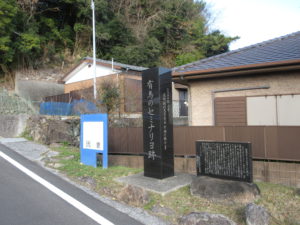 |
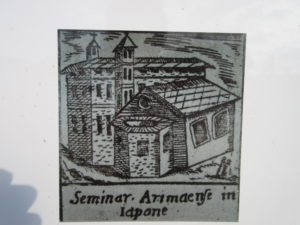 |
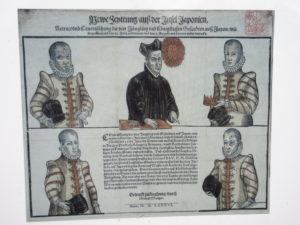 |
Among the first students, included member of Tensho youth mission to Europe who were
Ito Mansho Ito, Chijiwa Miguel, Hara Martino and Nakaura Julian.
Note : Seminary is an educational institution established in Japan by the Society of Jesus
between 1580 and 1614 to train Jesuit priests and monks.
Hidden Christian site, Kasuga Village
Kasuga Village and Mount Yasugatake is a Christian Pilgrimage site and is registered on
the World Heritage as Hidden Christian Sites in the Nagasaki Region.
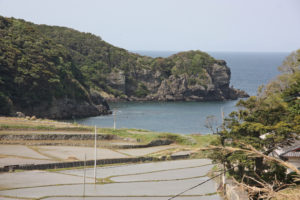 |
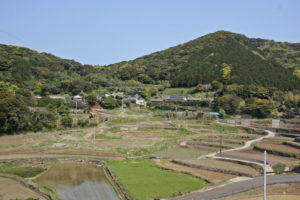 |
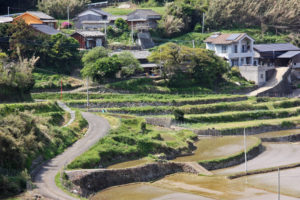 |
This idyllic, remote village was refuge to a small community of Hidden Christians who
practiced here for centuries, far from the prying eyes of the government. After the ban on
Christianity was lifted, the local villagers decided to continue practicing their own unique
brand of the religion rather than rejoin the Catholic Church. As a result, churches were not
erected in the village, and the religion remains outwardly invisible.
Hidden Christians
Oppression against Christians began with the Tokugawa shogunate’s ban
on Christianity. The missionaries were expelled to oversea countries, and
those who remained secretly in Japan were also captured and martyred.
Konishi Mansho who was the last Priest during the ban on Christianity,
was also martyred in 1644.
In the absence of priests, believers pretended to be Shinto or Buddhist
ostensibly in order to protect their faith.
The Christian organizations were created in each village to continue the
Christian faith and the faith was passed down from parents to children and
from children to grandchildren.
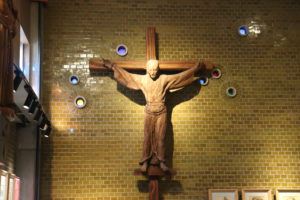 |
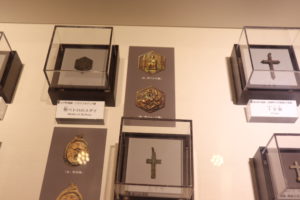 |
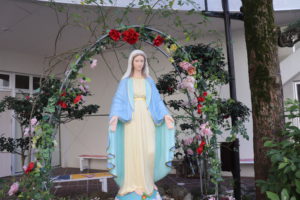 |
Hidden Christian
Even after lifted ban on Christianity, people who continue to practice their
faith in the same way as before are called “Hidden Christians”.
Hidden Christians in Nagasaki have been passed down since the ban on
Christianity in Hirado, Ikitsuki, the Goto Islands, Sotome, and around Nagasaki.
Kurose no Tsuji, martyrdom site of Gaspar Nishi Genka
The site where Christian Gaspar Nishi Genka was martyred in 1609, located on
Kurose Hill overlooking Nakae no shima between Hirado and Ikitsuki.
The tomb facing the sea is called Gaspar-sama and is a revered place for Ikitsuki’s
Hidden Christians.
The cross-shaped “Kurose no Tsuji Martyrdom Monument” was erected by Catholics
in 1991, and Mass is held every year around November 14th.
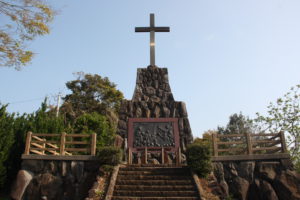 |
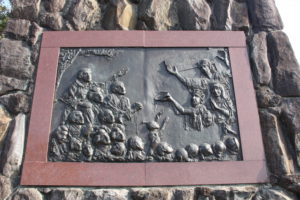 |
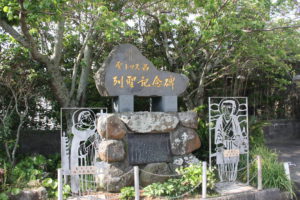 |
Gaspar Nishi Genka was the first martyr of Ikitsuki and the father of Thomas Rokuzaemon
Nishi who was one of the 16 Saint of Nagasaki, dedicated in Nakamachi Church in Nagasaki.
Shimabara Rebellion
The site is located in Minami-arima in Minami-Shimabara-city
and the Battle field of Shimabara Rebellion which was a peasant uprising against bakufu’s
persecution of Christians under the leadership of Amakusa Shiro in 1637.
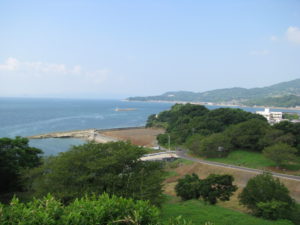 |
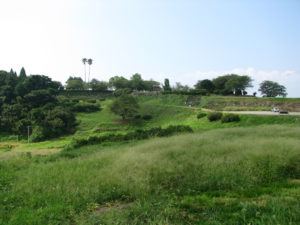 |
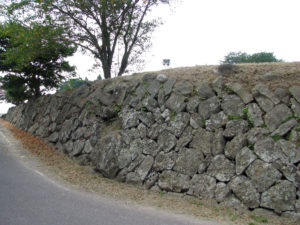 |
It was founded by Arima Takazumi in 1496 and was a flat castle with a fortress naturally created
both by the cliff facing Ariake Sea and the tide coming in. This Castle was abandoned since
Matsudaira Shigemasa, the load of Shimabara, built Shimabara Castle after the rupture of Arima
family ties.
 |
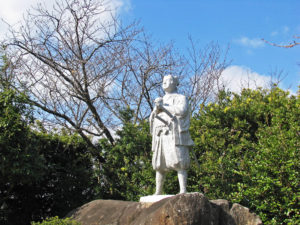 |
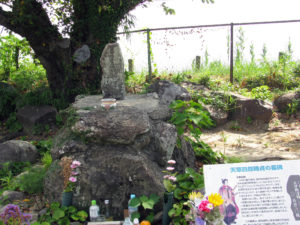 |
On February 27, 1638, he died in battle. The following day, the castle fell. 37,000 Christians
including women and children died a violent death.
It is registered on the UNESCO World Heritage as Hidden Christian Sites in the
Nagasaki Region in 2018.
26 Saints Pilgrimage route from Tokitsu to Nishizaka
26 Christians arrive at Tokitsu Port by the boat on the cold night of February 4, in 1597
and stayed one night on the boat. At dawn on February 5, they got off the ship with a cold b
ody and landed at Togitsu Port. Then they began walking the 12km path to Nishizaka,
the place of martyrdom. Passed through the mountain pass, and through Michinoo, Akasako,
and Urakami, and arrived at Nishizaka at 10 o’clock.
And as soon they arrived, they were all crucified on the cross.
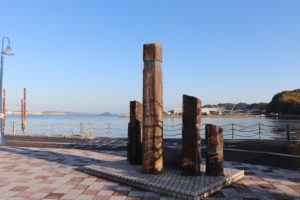 |
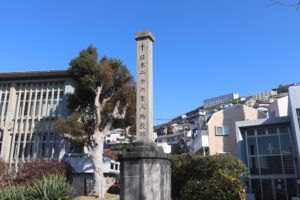 |
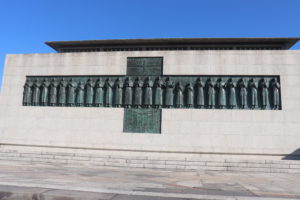 |
Then, Paul Miki said from the Cross
All of you who are here, please listen to me.
I did not com from the Philippines, I am a Japanese by birth, and a brother of the Society of Jesus.
I have committed no crime, and the only reason why I am put to death is that I have been
teaching the doctrine of our Lord Jesus Christ.
I am very happy to die for such cause, and see my death as great blessing from the Lord.
At this critical time, when you can rest assured that I will not try to deceive you, I want to stress
and make it unmistakably clear that man can find no way to salvation other than the Christian
way. The Christian law commands that we forgive our enemies and who have wronged us.
I must therefore say here that I forgive Taikosama (Hideyoshi).
Then they all ascended to heaven with the happy of giving the life to Christ.
In 1862, 26 Martyrs at Nishizaka were canonized by Pope Pius IX.
In 1950, Pope Pius XII designated the Nishizaka of Martyrdom of 26 Japanese
Saints as an official Pilgrimage site for Catholics
Unzen jigoku Martyrdom, 雲仙地獄殉教
When Matsukura Shigemasa became the new federal lord of Shimabara in 1616,
many people were Christians. Initially, he acquiesced in Christianity, because
he needed people’s cooperation to build Shimabara Castle.
However, this situation was known to Tokugawa Shogunate, and he strongly
commanded Christians in Shimabara to convert.
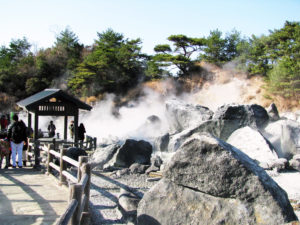 |
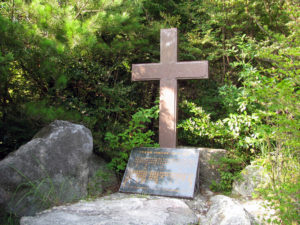 |
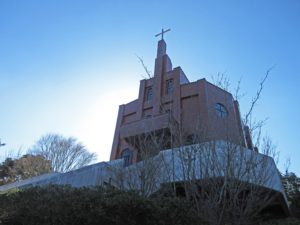 |
From 1627, Christians who did not convert were persecuted using the boiling water
of Unzen jigoku.
Many Christians were taken to this Unzen jigoku and martyred.
Unzen Church is dedicated to Father Antonio Ishida, a martyr of Unzen Hell, and
martyrdom festival is held every May.
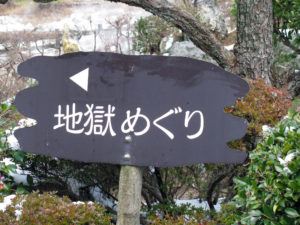 |
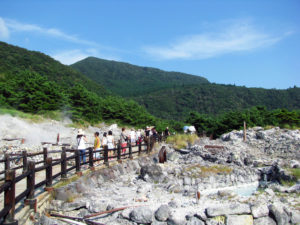 |
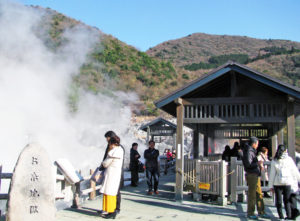 |
Unzen jigoku is a tourist spot in Unzen.
Jigoku, means Hell, is the number one attraction of Unzen with a peculiar smell of sulfur
emitted from the springs, and boiled hot water and white smoke rising from the ground
over a wide area. This is a striking reminder that Unzen Volcano is still very much alive.
Genna great Martyrdom in 1622, 元和の大殉教
25 years after the martyrdom of the 26 Saints, the blood of Christians was shed
once again at Nishizaka in Nagasaki.
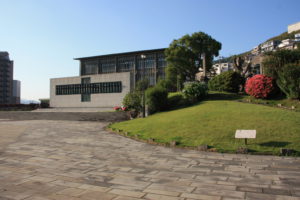 |
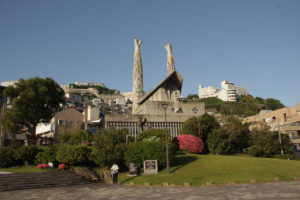 |
55 Christians were martyred who were arrested at Suzuta Prison in Omura and
Kurusu Prison in Nagasaki.
These included Italian missionary Carlo Spinola and Portuguese missionary
Domingos Jorge.
Nagasaki was a small Rome
Todos os Santos Church, the first church in Nagasaki, was built in 1569.
Federal lord Omura and the Jesuits made an agreement to make Nagasaki
a port for trade with Nanban. (Portugal and Spain) in 1570.
Nagasaki Port was opened and the first Portuguese ship arrived in 1571.
And development of the town of cape was started as Christian town in 1571
and the small Church of San Paulo was constructed at the tip of cape.
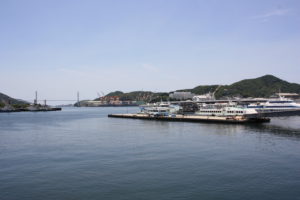 |
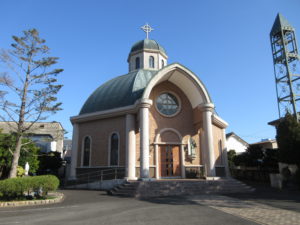 |
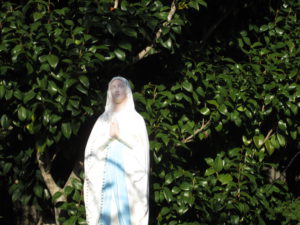 |
After that following Churches were constructed.
Misericordia Headquarters Church in 1583
Santa Maria Church in 1600
Santa Clara Church in 1603
Santiago Church in 1604
San Juan Petista Church in 1605
San Antonio Church in 1606
San Pedro Church in 1607
San Francisco Church in 1611
San Agustin Church in 1612
For 45 years after the first church was built, Nagasaki developed as a Christian town,
and by 1614, most of the 25,000 people were Christians.
It was as if Nagasaki was a small Rome.
However, due to the Tokugawa Shogunate’s Ban on Christianity in 1614, most of the
church buildings were destroyed within 15 days from November 3rd.
26 Saints are the first martyrs in Japan
26 Christians arrested in Kyoto who were consisted of 20 Japanese, 4 Spaniards,
1 Mexican, and 1 Portuguese.
They were forced to walk barefoot to Nagasaki for about a month.
On February 5, 1597, all 26 Christians arrived at Nishizaka and were tied to Crosses.
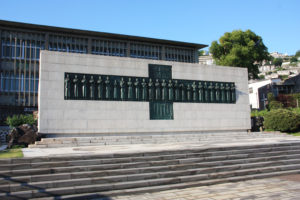 |
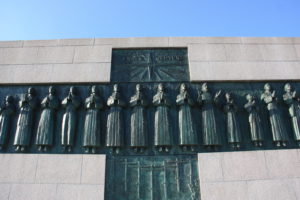 |
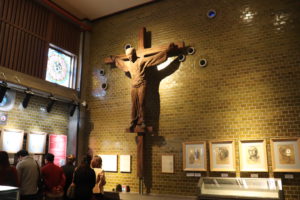 |
Paul Miki said from the Cross
All of you who are here, please listen to me.
I did not com from the Philippines, I am a Japanese by birth, and a brother of the Society
of Jesus.
I have committed no crime, and the only reason why I am put to death is that I have been
teaching the doctrine of our Lord Jesus Christ.
I am very happy to die for such cause, and see my death as great blessing from the Lord.
At this critical time, when you can rest assured that I will not try to deceive you, I want to stress
and make it unmistakably clear that man can find no way to salvation other than the Christian
way. The Christian law commands that we forgive our enemies and who have wronged us.
I must therefore say here that I forgive Taikosama (Hideyoshi).
I would rather have all the Japanese become Christians.
(From Luis Frois’s Martyrs Records, 1597)
Jan. 4, 2024
